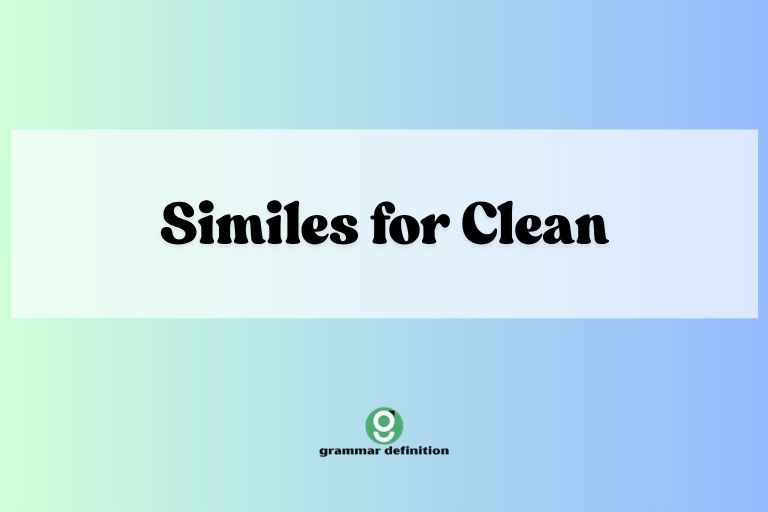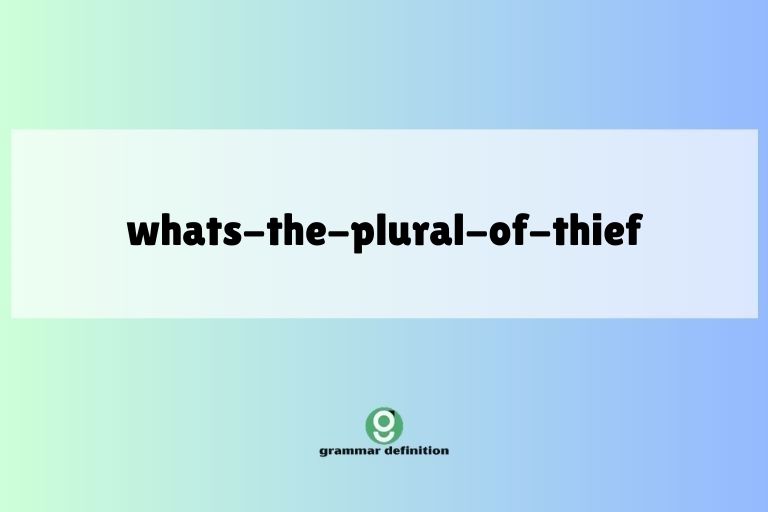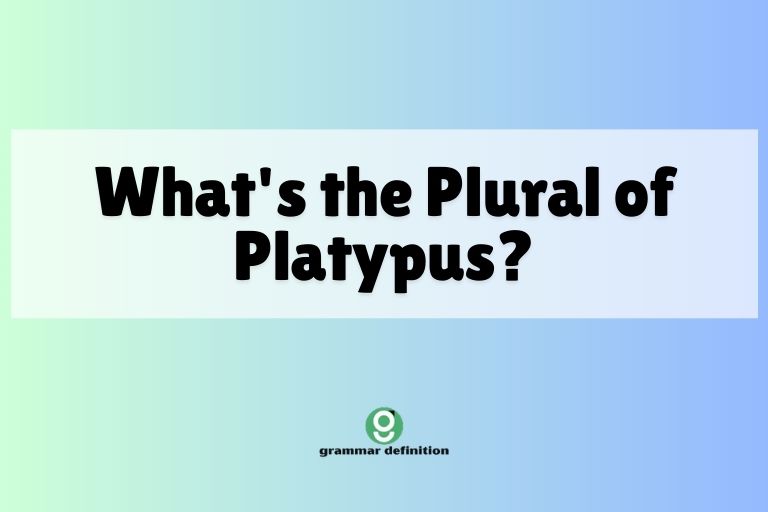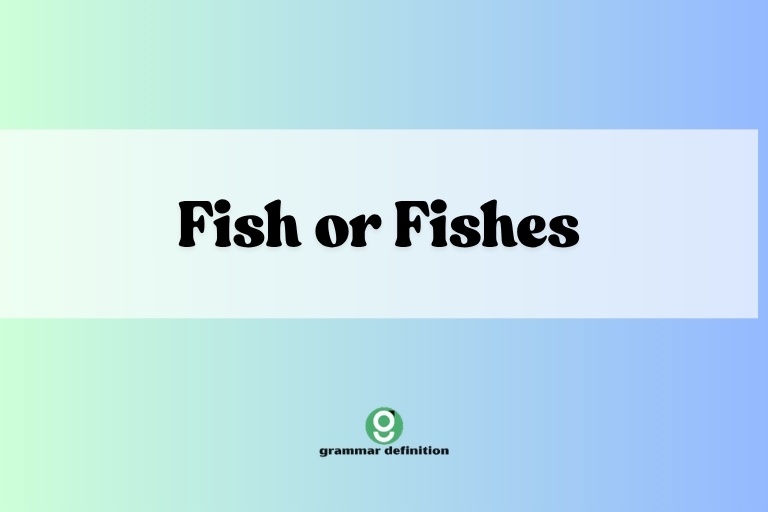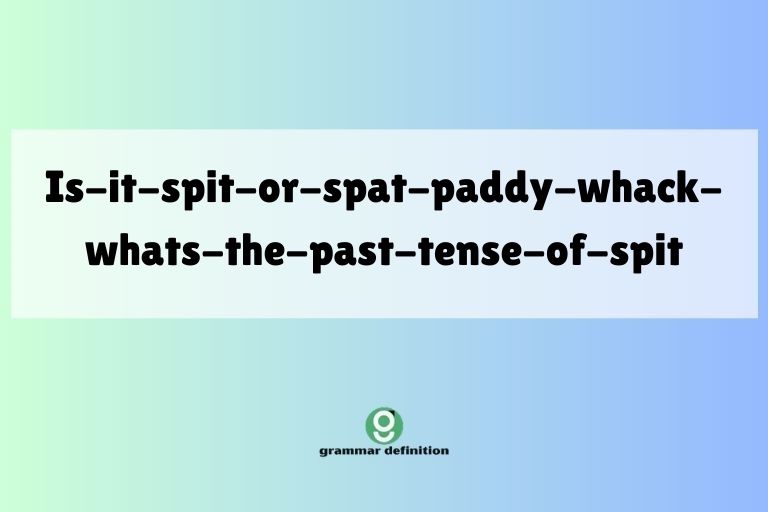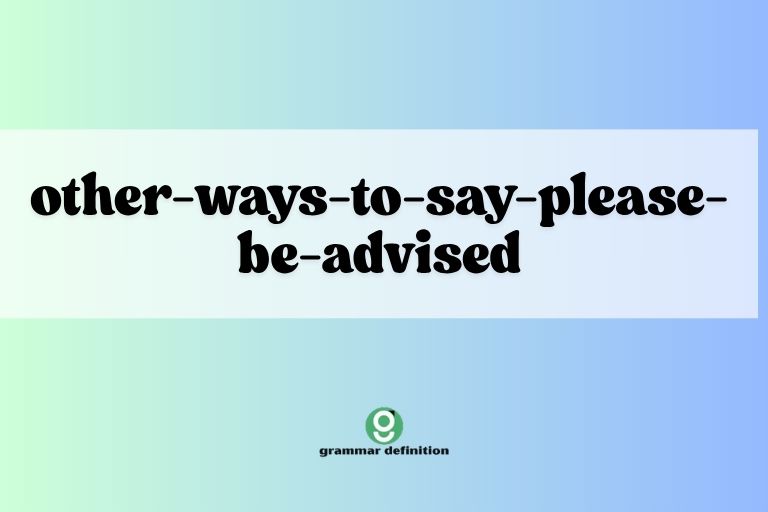Proper Noun Definition, Usage, and Examples
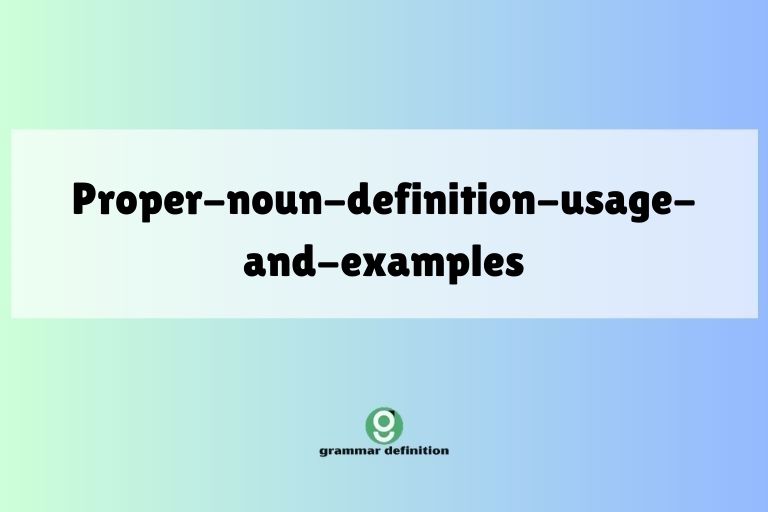
Understanding proper nouns is crucial for mastering English grammar. Proper nouns, unlike common nouns, identify specific people, places, things, or ideas and are always capitalized.
This article provides a comprehensive guide to proper nouns, covering their definition, types, usage rules, common mistakes, and advanced topics. Whether you’re a beginner or an advanced learner, this guide will help you confidently use proper nouns in your writing and speech.
Table of Contents
- Introduction
- Definition of Proper Nouns
- Structural Breakdown
- Types and Categories of Proper Nouns
- Examples of Proper Nouns
- Usage Rules for Proper Nouns
- Common Mistakes with Proper Nouns
- Practice Exercises
- Advanced Topics
- FAQ
- Conclusion
Introduction
Proper nouns are essential components of the English language, serving to distinguish specific entities from general categories. They provide clarity and precision in communication by pinpointing particular individuals, locations, organizations, or events.
Mastering the proper use of proper nouns, including capitalization rules, is vital for effective writing and speaking. This article offers a detailed exploration of proper nouns, including practical examples and exercises to solidify your understanding.
This comprehensive guide is designed for English language learners of all levels, from beginners to advanced students. Whether you are preparing for an English proficiency exam, seeking to improve your writing skills, or simply interested in deepening your knowledge of grammar, this article will provide valuable insights and practical tools.
By the end of this guide, you will have a solid understanding of proper nouns and be able to use them confidently and accurately.
Definition of Proper Nouns
A proper noun is a specific name for a particular person, place, thing, or idea. Unlike common nouns, which refer to general categories (e.g., *city*, *book*, *person*), proper nouns identify unique entities (e.g., *London*, *Pride and Prejudice*, *Emily*).
Proper nouns always begin with a capital letter, regardless of their position in a sentence. This capitalization distinguishes them from common nouns and signals their unique identity.
Proper nouns can be single words (e.g., *Paris*) or multiple words (e.g., *United States of America*). They can also include titles or honorifics when referring to specific individuals (e.g., *Dr.
Smith*, *Queen Elizabeth*). Understanding the distinction between proper and common nouns is fundamental to correct grammar and clear communication.
Classification of Proper Nouns
Proper nouns can be classified into several categories based on what they name. These categories include names of people, places, organizations, days of the week, months of the year, holidays, and specific works of art or literature.
Each category has its own specific conventions and usage rules. Recognizing these different types of proper nouns is essential for using them correctly.
Function of Proper Nouns
The primary function of a proper noun is to identify a specific and unique entity. They allow us to refer to particular individuals, locations, or events without ambiguity.
By using proper nouns, we can avoid confusion and ensure that our meaning is clear. Proper nouns often carry cultural and historical significance, reflecting the importance of the entities they name.
Contexts of Proper Nouns
Proper nouns are used in a wide variety of contexts, from everyday conversations to formal writing. They appear in news articles, academic papers, literature, and business communications.
The proper use of proper nouns is essential for maintaining credibility and clarity in any form of communication. In legal and official documents, the correct spelling and capitalization of proper nouns are particularly important.
Structural Breakdown
Proper nouns, while seemingly simple, exhibit certain structural patterns that are important to recognize. They can be single words or multi-word phrases.
Understanding these structures helps in identifying and using them correctly.
Single-word proper nouns are straightforward, such as *John*, *Tokyo*, or *Amazon*. Multi-word proper nouns, however, require careful attention to capitalization.
For example, in *United Kingdom*, both words are capitalized because they are part of the proper noun.
Titles and honorifics often precede proper nouns, adding another layer of complexity. For instance, *President Obama* includes the title “President” followed by the proper noun “Obama.” Similarly, *Sir Isaac Newton* combines the honorific “Sir” with the proper noun “Isaac Newton.”
Capitalization Rules
The most fundamental rule for proper nouns is that they must always be capitalized. This rule applies regardless of where the proper noun appears in a sentence.
Even if a proper noun is part of a longer phrase or title, the proper noun itself must be capitalized.
For multi-word proper nouns, all significant words are capitalized. Articles (a, an, the), prepositions (of, in, at), and conjunctions (and, but, or) are typically not capitalized unless they are the first or last word of the proper noun.
For example, in *The Lord of the Rings*, “The,” “Lord,” and “Rings” are capitalized, while “of” is not.
Articles with Proper Nouns
The use of articles (a, an, the) with proper nouns can be tricky. Generally, articles are not used with proper nouns referring to people or places.
For example, we say “I visited Paris,” not “I visited the Paris.” However, there are exceptions to this rule.
Articles are often used with proper nouns that refer to geographical features like rivers, oceans, and mountain ranges. For example, we say “the Amazon River,” “the Pacific Ocean,” and “the Rocky Mountains.” Articles are also used with proper nouns that refer to institutions or organizations, such as “the United Nations” and “the Smithsonian Institution.”
Types and Categories of Proper Nouns
Proper nouns can be categorized based on what they specifically name. These categories help in understanding the different types of proper nouns and their specific usage.
Names of People
This is the most common type of proper noun. It includes first names, last names, and full names.
For example, *John Smith*, *Emily Dickinson*, and *Albert Einstein* are all proper nouns that refer to specific individuals.
Names of Places
This category includes names of countries, cities, states, continents, rivers, mountains, and other geographical locations. Examples include *Canada*, *Tokyo*, *California*, *Africa*, *Mississippi River*, and *Mount Everest*.
Names of Organizations
This category includes names of companies, schools, government agencies, and other institutions. Examples include *Google*, *Harvard University*, *Federal Bureau of Investigation*, and *United Nations*.
Days of the Week, Months of the Year, and Holidays
These are always capitalized because they are considered proper nouns. Examples include *Monday*, *January*, *Thanksgiving*, and *Christmas*.
Titles of Works of Art, Literature, and Music
This category includes titles of books, movies, songs, paintings, and other creative works. Examples include *Pride and Prejudice*, *The Godfather*, *Imagine*, and *Mona Lisa*.
Examples of Proper Nouns
To further illustrate the concept of proper nouns, here are several examples categorized by type. These examples will help you understand how proper nouns are used in different contexts.
Examples of Proper Nouns: People
The following table provides a list of proper nouns that represent names of people. Each example is a specific individual, and their names are always capitalized.
| Category | Proper Noun | Example Sentence |
|---|---|---|
| First Name | Alice | Alice is reading a book. |
| Last Name | Johnson | Mr. Johnson is a teacher. |
| Full Name | Robert Downey Jr. | Robert Downey Jr. starred in Iron Man. |
| Title and Name | Dr. Jane Goodall | Dr. Jane Goodall is a famous primatologist. |
| Famous Figure | William Shakespeare | William Shakespeare wrote many famous plays. |
| Historical Figure | Cleopatra | Cleopatra was the last active ruler of the Ptolemaic Kingdom of Egypt. |
| Musician | Beyoncé | Beyoncé is a world-renowned singer. |
| Athlete | LeBron James | LeBron James is a professional basketball player. |
| Author | J.K. Rowling | J.K. Rowling wrote the Harry Potter series. |
| Scientist | Marie Curie | Marie Curie was a pioneer in radioactivity research. |
| Politician | Angela Merkel | Angela Merkel served as the Chancellor of Germany. |
| Artist | Vincent van Gogh | Vincent van Gogh was a post-impressionist painter. |
| Actor | Meryl Streep | Meryl Streep is considered one of the greatest actresses. |
| Inventor | Thomas Edison | Thomas Edison invented the light bulb. |
| Philosopher | Socrates | Socrates was a classical Greek philosopher. |
| Religious Figure | Buddha | Buddha is the founder of Buddhism. |
| Explorer | Christopher Columbus | Christopher Columbus sailed across the Atlantic Ocean. |
| Activist | Malala Yousafzai | Malala Yousafzai is a Pakistani activist for female education. |
| Comedian | Charlie Chaplin | Charlie Chaplin was a famous silent film comedian. |
| Animator | Walt Disney | Walt Disney created Mickey Mouse. |
| Chef | Gordon Ramsay | Gordon Ramsay is a celebrity chef. |
| Designer | Coco Chanel | Coco Chanel was a famous fashion designer. |
| Journalist | Anderson Cooper | Anderson Cooper is a CNN anchor. |
| Model | Gisele Bündchen | Gisele Bündchen is a Brazilian supermodel. |
| Youtuber | PewDiePie | PewDiePie is a popular YouTuber. |
Examples of Proper Nouns: Places
The following table provides examples of proper nouns that represent names of places. These include countries, cities, rivers, and mountains, all of which are capitalized.
| Category | Proper Noun | Example Sentence |
|---|---|---|
| Country | Japan | I want to visit Japan someday. |
| City | New York | New York is a bustling metropolis. |
| River | Amazon River | The Amazon River is the largest river by discharge volume of water in the world. |
| Mountain | Mount Everest | Mount Everest is the highest mountain above sea level. |
| Continent | Europe | Europe is a diverse continent with many countries. |
| State | Texas | Texas is known for its barbecue. |
| Ocean | Atlantic Ocean | The Atlantic Ocean separates the Americas from Europe and Africa. |
| Lake | Lake Superior | Lake Superior is one of the Great Lakes. |
| Island | Hawaii | Hawaii is a popular tourist destination. |
| Desert | Sahara Desert | The Sahara Desert is the largest hot desert in the world. |
| National Park | Yellowstone National Park | Yellowstone National Park is famous for its geysers. |
| Building | Empire State Building | The Empire State Building is an iconic skyscraper in New York City. |
| Bridge | Golden Gate Bridge | The Golden Gate Bridge is a famous landmark in San Francisco. |
| Street | Wall Street | Wall Street is the financial center of New York City. |
| Square | Times Square | Times Square is known for its bright lights and billboards. |
| Region | Middle East | The Middle East is a region in Western Asia and Northern Africa. |
| Valley | Silicon Valley | Silicon Valley is known for its technology companies. |
| Peninsula | Iberian Peninsula | The Iberian Peninsula includes Spain and Portugal. |
| Bay | San Francisco Bay | San Francisco Bay is a large estuary in California. |
| Forest | Amazon Rainforest | The Amazon Rainforest is a vital ecosystem. |
| Volcano | Mount Vesuvius | Mount Vesuvius is a volcano near Naples, Italy. |
| Canal | Panama Canal | The Panama Canal connects the Atlantic and Pacific Oceans. |
| Waterfall | Niagara Falls | Niagara Falls is a group of three waterfalls on the border of Canada and the United States. |
| Island Chain | The Bahamas | The Bahamas are known for their beautiful beaches. |
Examples of Proper Nouns: Organizations
The following table provides examples of proper nouns that represent names of organizations. These include companies, schools, and government agencies, all of which require capitalization.
| Category | Proper Noun | Example Sentence |
|---|---|---|
| Company | Microsoft | Microsoft is a leading technology company. |
| University | Oxford University | Oxford University is one of the oldest universities in the world. |
| Government Agency | Federal Bureau of Investigation | The Federal Bureau of Investigation is a U.S. government agency. |
| International Organization | United Nations | The United Nations promotes international cooperation. |
| Hospital | Mayo Clinic | The Mayo Clinic is a renowned medical center. |
| Museum | Louvre Museum | The Louvre Museum is home to the Mona Lisa. |
| Bank | Bank of America | Bank of America is a large financial institution. |
| Airline | Delta Airlines | Delta Airlines is a major U.S. airline. |
| Sports Team | Los Angeles Lakers | The Los Angeles Lakers are a professional basketball team. |
| Theater | The Metropolitan Opera | The Metropolitan Opera is a famous opera house in New York City. |
| Charity | American Red Cross | The American Red Cross provides disaster relief and humanitarian aid. |
| Newspaper | The New York Times | The New York Times is a well-respected newspaper. |
| Television Network | British Broadcasting Corporation | The British Broadcasting Corporation is a public service broadcaster. |
| Restaurant Chain | McDonald’s | McDonald’s is a global fast-food chain. |
| Hotel Chain | Hilton Hotels & Resorts | Hilton Hotels & Resorts is a well-known hotel chain. |
| Law Firm | Skadden, Arps, Slate, Meagher & Flom | Skadden, Arps, Slate, Meagher & Flom is a global law firm. |
| Consulting Firm | McKinsey & Company | McKinsey & Company is a management consulting firm. |
| Engineering Firm | Bechtel Corporation | Bechtel Corporation is an engineering and construction company. |
| Investment Bank | Goldman Sachs | Goldman Sachs is a leading global investment banking firm. |
| Private Equity Firm | The Blackstone Group | The Blackstone Group is a global private equity firm. |
Examples of Proper Nouns: Days, Months, and Holidays
The following table illustrates proper nouns that represent days of the week, months of the year, and holidays. These are always capitalized in English.
| Category | Proper Noun | Example Sentence |
|---|---|---|
| Day of the Week | Monday | I have a meeting on Monday. |
| Month of the Year | January | January is the first month of the year. |
| Holiday | Christmas | We celebrate Christmas in December. |
| Day of the Week | Wednesday | The report is due by Wednesday. |
| Month of the Year | August | August is usually a hot month. |
| Holiday | Thanksgiving | Thanksgiving is a time for family and gratitude. |
| Day of the Week | Saturday | I like to relax on Saturday. |
| Month of the Year | November | November is the month before December. |
| Holiday | New Year’s Day | We celebrate New Year’s Day on January 1st. |
Examples of Proper Nouns: Titles of Works
The following table provides examples of proper nouns that represent titles of books, movies, songs, and other works of art. Remember to capitalize the main words in the title.
| Category | Proper Noun | Example Sentence |
|---|---|---|
| Book | Pride and Prejudice | Pride and Prejudice is a classic novel by Jane Austen. |
| Movie | The Godfather | The Godfather is a famous film. |
| Song | Imagine | Imagine is a song by John Lennon. |
| Painting | Mona Lisa | The Mona Lisa is a famous painting by Leonardo da Vinci. |
| Play | Hamlet | Hamlet is a tragedy by William Shakespeare. |
| Album | Thriller | Thriller is Michael Jackson’s best-selling album. |
| Poem | The Raven | The Raven is a poem by Edgar Allan Poe. |
| Television Show | Game of Thrones | Game of Thrones is a popular television series. |
| Video Game | The Legend of Zelda | The Legend of Zelda is a classic video game series. |
Usage Rules for Proper Nouns
Using proper nouns correctly involves understanding several key rules. These rules govern capitalization, the use of articles, and other grammatical considerations.
Capitalization Rule
The most important rule for proper nouns is that they must always be capitalized. This rule applies regardless of where the proper noun appears in the sentence.
For multi-word proper nouns, capitalize all significant words, excluding articles, prepositions, and conjunctions unless they are the first or last word.
Articles with Proper Nouns Rule
Generally, articles are not used with proper nouns referring to people or places. However, there are exceptions.
Articles are often used with geographical features like rivers, oceans, and mountain ranges. They are also used with institutions and organizations.
Possessive Form Rule
To form the possessive of a proper noun, add an apostrophe and an “s” (‘s). If the proper noun ends in “s,” you can either add an apostrophe and an “s” (‘s) or just an apostrophe (‘).
Both forms are generally acceptable, but consistency is important.
Plurals of Proper Nouns Rule
To make proper nouns plural, generally add an “s” to the end of the word. If the proper noun ends in “s,” “x,” “ch,” or “sh,” add “es.” However, be careful with names that are already plural, such as “the Joneses.”
Exceptions to the Rules
Like many grammar rules, there are exceptions to the rules governing proper nouns. Some proper nouns may not follow the standard capitalization rules due to stylistic choices or historical reasons.
It’s important to be aware of these exceptions and to consult reliable sources when in doubt.
Common Mistakes with Proper Nouns
Even experienced writers sometimes make mistakes with proper nouns. Here are some common errors to watch out for.
Incorrect Capitalization
One of the most common mistakes is failing to capitalize a proper noun. Remember that all proper nouns must be capitalized, regardless of their position in the sentence.
Incorrect: I visited paris last summer.
Correct: I visited Paris last summer.
Incorrect Use of Articles
Using an article with a proper noun when it’s not needed, or omitting an article when it is needed, is another common mistake. Remember the general rule: don’t use articles with names of people or most places, but do use them with geographical features and institutions.
Incorrect: I went to the London.
Correct: I went to London.
Incorrect: We visited Smithsonian Institution.
Correct: We visited the Smithsonian Institution.
Misspelling Proper Nouns
Proper nouns, especially names of people and places, are often misspelled. Always double-check the spelling of proper nouns, especially if you are not familiar with them.
Incorrect: I met Emely at the party.
Correct: I met Emily at the party.
Forgetting Multi-Word Capitalization
Failing to capitalize all the significant words in a multi-word proper noun is another common mistake. Remember to capitalize all nouns, pronouns, adjectives, verbs, and adverbs in the title.
Incorrect: I read the lord of the rings.
Correct: I read The Lord of the Rings.
Practice Exercises
Test your understanding of proper nouns with these practice exercises. Identify the proper nouns in each sentence and correct any errors in capitalization or usage.
Exercise 1: Identifying Proper Nouns
Identify the proper nouns in the following sentences and write them down. Ensure that they are correctly capitalized.
| Question | Answer |
|---|---|
| 1. I am going to visit london next week. | London |
| 2. my friend john is a doctor. | John |
| 3. we celebrate christmas in december. | Christmas, December |
| 4. she is reading pride and prejudice. | Pride and Prejudice |
| 5. they work for google. | |
| 6. he lives in california. | California |
| 7. we visited the eiffel tower. | Eiffel Tower |
| 8. i study at harvard university. | Harvard University |
| 9. they went to the atlantic ocean. | Atlantic Ocean |
| 10. she was born on monday. | Monday |
Exercise 2: Correcting Capitalization Errors
Correct the capitalization errors in the following sentences. Rewrite the sentences with the proper nouns correctly capitalized.
| Question | Answer |
|---|---|
| 1. she is a student at oxford university. | She is a student at Oxford University. |
| 2. i want to visit the great wall of china. | I want to visit the Great Wall of China. |
| 3. my favorite movie is the shawshank redemption. | My favorite movie is The Shawshank Redemption. |
| 4. he works for the federal bureau of investigation. | He works for the Federal Bureau of Investigation. |
| 5. we celebrate thanksgiving in november. | We celebrate Thanksgiving in November. |
| 6. she is reading a book by william shakespeare. | She is reading a book by William Shakespeare. |
| 7. i went to new york city last year. | I went to New York City last year. |
| 8. they live near the mississippi river. | They live near the Mississippi River. |
| 9. he works at bank of america. | He works at Bank of America. |
| 10. she is a fan of lady gaga. | She is a fan of Lady Gaga. |
Exercise 3: Fill in the Blanks
Fill in the blanks with appropriate proper nouns. Make sure to capitalize them correctly.
| Question | Answer |
|---|---|
| 1. I am learning to speak __________. | French (or any other language) |
| 2. __________ is the capital of France. | Paris |
| 3. My favorite day of the week is __________. | Saturday (or any other day) |
| 4. __________ is a famous author. | Stephen King (or any other author) |
| 5. I want to visit __________ National Park. | Yellowstone (or any other park) |
| 6. __________ is a popular social media platform. | Instagram (or any other platform) |
| 7. I celebrate my birthday in __________. | July (or any other month) |
| 8. __________ is a famous scientist. | Albert Einstein (or any other scientist) |
| 9. I enjoy listening to __________ music. | Classical (or any other genre) |
| 10. __________ is a major holiday in December. | Christmas |
Advanced Topics
For advanced learners, here are some more complex aspects of proper nouns to consider.
Proper Nouns as Adjectives
Sometimes, proper nouns are used as adjectives to describe other nouns. When this happens, the proper noun still needs to be capitalized.
For example, “Italian food” uses the proper noun “Italian” as an adjective to describe “food.”
Generic Terms Derived from Proper Nouns
Some proper nouns become so widely used that they evolve into generic terms. When this happens, they are no longer capitalized unless they are used to refer to the original specific entity.
For example, “aspirin” was originally a brand name but is now a generic term for acetylsalicylic acid.
Cultural Sensitivity in Proper Noun Usage
When using proper nouns, it’s important to be mindful of cultural sensitivity. Some names and places may have different spellings or pronunciations in different languages or cultures.
Always strive to use the most accurate and respectful form of a proper noun.
FAQ
Here are some frequently asked questions about proper nouns.
- What is the difference between a proper noun and a common noun?
A proper noun names a specific person, place, thing, or idea and is always capitalized. A common noun refers to a general category and is not capitalized unless it begins a sentence. - Do I need to capitalize every word in a proper noun?
No, you only need to capitalize the significant words, such as nouns, pronouns, adjectives, verbs, and adverbs. Articles, prepositions, and conjunctions are usually not capitalized unless they are the first or last word of the proper noun. - When should I use an article with a proper noun?
Generally, you should not use articles with proper nouns referring to people or places. However, use articles with geographical features like rivers, oceans, and mountain ranges, as well as with institutions and organizations. - How do I form the possessive of a proper noun?
Add an apostrophe and an “s” (‘s) to the proper noun. If the proper noun ends in “s,” you can add either an apostrophe and an “s” (‘s) or just an apostrophe (‘). - What are some common mistakes to avoid when using proper nouns?
Common mistakes include failing to capitalize proper nouns, using articles incorrectly, misspelling proper nouns, and not capitalizing all significant words in multi-word proper nouns. - Can a proper noun become a common noun?
Yes, some proper nouns become so widely used that they evolve into generic terms. When this happens, they are no longer capitalized unless they are used to refer to the original specific entity. - Are there exceptions to the capitalization rules for proper nouns?
Yes, there are exceptions due to stylistic choices or historical reasons. It’s important to be aware of these exceptions and to consult reliable sources when in doubt. - How do I handle proper nouns in foreign languages?
When using proper nouns from other languages, try to maintain their original spelling and capitalization if possible, unless there’s a standard English adaptation. If you’re unsure, consult a reliable source or a native speaker.
Conclusion
Understanding and using proper nouns correctly is a fundamental skill in English grammar. Proper nouns distinguish specific entities from general categories, providing clarity and precision in communication.
By mastering the rules of capitalization, article usage, and possessive forms, you can confidently use proper nouns in your writing and speech.
<
p>Continue practicing and refining your knowledge of proper nouns to enhance your overall language proficiency. Whether you are writing essays, giving presentations, or engaging in everyday conversations, a solid understanding of proper nouns will help you communicate more effectively and accurately.

